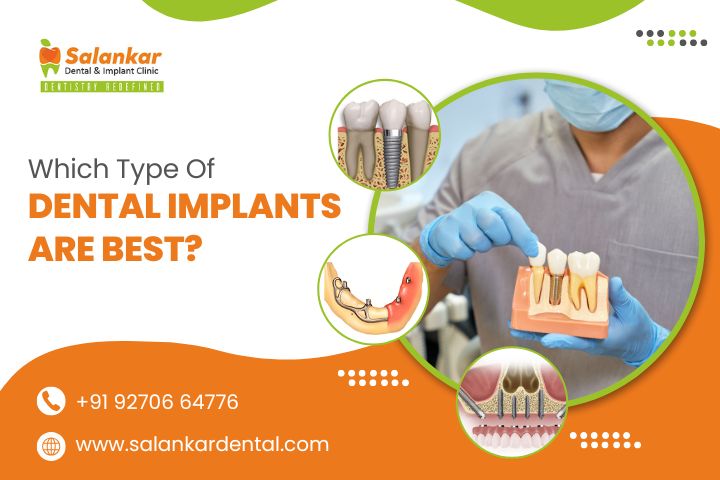If you’re missing one or more teeth, you’re not alone, and you’re not without options. At Salankar Dental Clinic, we’ve helped countless patients regain their smile, confidence, and comfort through dental implants in Somalwada. But with several implant options available, one of the most common questions we hear is: “Which type of dental implants are best?”
The answer is based on your oral health, bone structure, and personal preferences. Let’s walk you through the different types of dental implants, materials, and restorations available, so you can make a confident and informed decision with our guidance.
The 3 Main Types of Dental Implants
1. Endosteal Implants
Endosteal implants are the most common ones and are inserted into the jawbone. They resemble small screws and serve as a sturdy root replacement, eventually fusing with your jawbone, a process called osseointegration.
Best for: Those who have good jawbone density
Benefits:
- Most natural look and function
- Long-lasting (can last a lifetime with care)
- Promotes jawbone health by stimulating bone tissue
If you’re considering dental implants in Somalwada and have a healthy jawbone, this is likely your ideal option.
2. Subperiosteal Implants (For Low Bone Density Without Grafting)
These implants sit on top of the jawbone but underneath the gum tissue. Instead of being anchored in the bone, they’re supported by the gum as it heals around the frame.
Best for: Individuals with insufficient jawbone who prefer not to undergo bone grafting
Benefits:
- Less invasive procedure
- Quicker recovery in some cases
At Salankar Dental Clinic, we may recommend this for patients who are not ideal candidates for bone grafting or prefer a shorter treatment timeline.
3. Zygomatic Implants (Advanced Bone Loss Cases)
Zygomatic implants are placed into the cheekbone (zygoma) instead of the jaw. This is a complex and specialized procedure used only when there’s severe bone loss in the upper jaw.
Best for: Patients who have more than usual lost the density of their jawbone and want a fixed solution without grafting
Benefits:
- Eliminates the need for bone grafting
- Immediate support for artificial teeth in some cases
This option is offered through advanced oral surgery partners when traditional implants aren’t viable.
Dental Implant Materials: Titanium vs. Zirconia
Titanium Implants
The majority of dental implants, especially those placed at our clinic in Somalwada, are made of titanium. It’s biocompatible, strong, and has decades of proven clinical success.
Benefits:
- Extremely durable
- Long history of successful outcomes
- Ideal for most patients
Zirconia Implants
For patients with metal allergies or who prefer a non-metallic option, zirconia implants offer a holistic and hypoallergenic alternative. Though slightly newer, they’re gaining popularity.
Benefits:
- Metal-free and white in color
- Biocompatible and corrosion-resistant
- Great for aesthetic zones (like front teeth)
What Can Dental Implants Support?
Dental implants aren’t just for single tooth replacements, they’re incredibly versatile:
- Single Tooth Replacement: One implant supports one crown.
- Implant Bridges: Two or more implants support a bridge for multiple adjacent missing teeth.
- Implant-Supported Dentures: Four to six implants anchor a full arch of teeth, providing superior comfort compared to traditional dentures.
We offer all of these options at Salankar Dental Clinic, right here in Somalwada.
How Is a Dental Implant Procedure Performed?
At Salankar Dental Clinic, our dental implant procedures follow a meticulous, patient-focused approach. Here’s what you can expect during the process:
- Consultation & Planning
Your journey begins with a thorough consultation. We assess your oral health using advanced digital X-rays or 3D scans to evaluate your jawbone density and decide the best implant approach.
- Tooth Extraction (If Needed)
If the tooth is still present and damaged beyond repair, it may be extracted prior to implant placement.
- Bone Grafting (Optional)
If your jawbone lacks the necessary volume or strength, a bone graft may be performed. This helps create a stable foundation for the implant.
- Implant Placement
During a minimally invasive surgical procedure, the implant is embedded into the jawbone. This serves as the artificial root. The procedure is typically done under local anesthesia.
- Healing & Osseointegration
Over the next 3 to 6 months, your implant naturally integrates with your bone in a process known as osseointegration. This forms a strong anchor for the replacement tooth.
- Abutment Placement
After the implant is fully integrated, an abutment (a small connector) is attached. This part protrudes slightly above the gum and holds the crown.
- Crown or Prosthesis Placement
Finally, a custom-made crown, bridge, or denture is securely placed on top of the abutment, completing your smile restoration.
Post-Treatment Care for Dental Implants
To ensure your dental implants last for decades or even a lifetime, proper care is essential. Here are some expert tips:
- Brush and Floss Daily: Use a soft-bristle brush and non-abrasive toothpaste to clean your teeth twice a day.
- Avoid Hard or Sticky Foods Initially: Especially during the healing phase.
- Stay Hydrated & Avoid Tobacco: Smoking can delay healing and increase the risk of implant failure.
- Regular Dental Checkups: Schedule periodic visits to Salankar Dental Clinic.
- Use an Antibacterial Mouthwash: Especially in the first few months post-implant.
Frequently Asked Questions (FAQs)
1. Are dental implants painful?
The implant procedure takes place under the careful administration of anesthesia, ensuring that you remain completely comfortable and pain-free throughout the process. While it is common to experience some post-operative discomfort afterward, this discomfort is typically manageable with appropriate pain relief measures. Rest assured, your healthcare team will provide guidance on how to best alleviate any discomfort and aid in your recovery.
2. How long do dental implants last?
With attentive care and regular maintenance, dental implants can endure for 15 years or even a lifetime, providing individuals with a durable solution for missing teeth. Proper oral hygiene practices, including daily brushing and flossing, along with routine visits to the dentist, play a crucial role in preserving the longevity and functionality of these implants.
3. Who is not eligible for dental implants?
Individuals who experience poorly managed diabetes, significant gum disease, or specific underlying medical conditions may not be the most suitable candidates for certain treatments or procedures. This is due to the potential complications and challenges that could arise from these health issues
4. How much do dental implants cost in Somalwada?
The costs associated with dental implants can fluctuate significantly depending on several factors. These include the number of implants required, the specific materials selected for the procedure, and any additional treatments that may be necessary to ensure optimal results. Each of these elements plays a crucial role in determining the overall price, making it essential to consider individual needs and circumstances.
5. Can implants be placed immediately after extraction?
Absolutely, in numerous instances, it is indeed feasible to achieve immediate placement as long as there is adequate bone support. This support is crucial, as it provides the necessary stability for successful integration and function.
Restore Your Confidence with Dental Implants in Somalwada
If you’ve been hiding your smile due to missing teeth, now is the time to act. Dental implants are a permanent, natural-looking solution that can change your life. At Salankar Dental Clinic, we offer expert care, compassionate service, and reliable outcomes.
Book your personalized implant consultation with us.Visit our clinic in Somalwada and take the first step toward a healthier, more confident smile.



